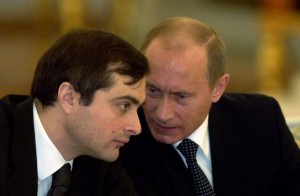The Russian press reported early in January of 2012 that a week before significant change had taken place in President Dmitri Medvedev’s Administration: Vladislav Surkov, a deputy prime minister in the Russian government, will be responsible for the modernization of education, science, and healthcare as well as for the development of the global navigation system (GLONASS).
Deputy Prime Minister Vladislav Surkov responded: “Mr. President, thank you very much. First, I must say that for me it is a great honor, because everyone knows that economic modernization and the creation of innovation infrastructure are your strategic priority. … I look forward to new experiences and I hope that I will not fail you and the Prime Minister, and most importantly, the people involved in economic development: scientists, engineers, entrepreneurs — all talented people…”

Russian Prime Minister Vladimir Putin specified the new area of responsibility for the former first deputy head of the presidential administration during a meeting with Mr. Surkov as follows: “You were in charge of not only domestic policies but also modernization, so we are going to continue in this direction … I also ask you to take up some high-tech issues as GLONASS, and to give priority to the modernization of education, science and healthcare.”
The move came after the first mass protests since 1990s over disputed December 4 parliamentary elections rattled the authorities as Putin plans to return to the presidency in 2012 polls after his four year stint as premier.
Of interest is the Moscow (AP) report of Feb. 2 quoting former Soviet leader Mikhail Gorbachev as saying that “Russian Prime Minister Vladimir Putin has exhausted himself as Russia’s leader and his inability to change the Kremlin political system might prompt more massive protests.”
The report goes on to say that “Putin is almost certain to win the upcoming election in March [of 2012] despite recent opposition street rallies, Russia’s largest since the Soviet collapse.”
“Gorbachev said Thursday that if Putin does not change the system he built, ‘everything will end up on city squares’.” And further:
“Gorbachev recently called on the Kremlin to annul the results of the December parliamentary election that triggered the rallies.”
An ominous figure, Mr. Surkov, 47, is often ranked as Russia’s third-most-powerful politician, after President Medvedev and Prime Minister Vladimir Putin. However, insiders say that his influence over the whole apparatus of Kremlin power is far greater than that of the “figurehead president” Medvedev. According to them, he is “real No. 2”, and his influence is set to grow, rather than diminish, with Putin’s inevitable reelection.
Surkov is known as the Kremlin’s main propagandist and ideologist as well as mastermind behind the concept of “managed democracy” and an organizer of the pro-Kremlin Putin’s youth squads “Nashi,” the implication being a play on words “nashi” (“ours”) versus “vashi” (“theirs,” i.e., the pro-democracy movement). It is sometimes said that, with the cynicism of a young Stalin, Surkov plays on both teams, “ours” as well as “theirs.”
In Moscow, Surkov is referred to as the “gray cardinal,” a behind-the-scenes manipulator who inspires fascination and fear. For more than a decade, he has helped shape the ideological message of Russia’s leaders, its governing party, United Russia, of parties in opposition to United Russia, its youth movements, and virtually anything widely published or broadcast in the country.
The Russian billionaire Mikhail D. Prokhorov called for Mr.Surkov’s ouster, condemning him as a “puppet master” who prevented the growth of real democracy. It is not surprising that Mr. Prokhorov’s attack was edited out of the Moscow evening news and seemed to vanish. Now, with two electoral campaigns under way, Mr. Surkov is as essential to the Kremlin as he has ever been.
Mr. Surkov’s job is to oversee the relationship of the executive branch with Russia’s Parliament, its regional leaders, and its political parties and mass media.
A cunning man, a schemer, a manipulator, a survivor, with his own far-reaching goals and his not yet revealed and not yet realized dictatorial ambitions, he is out to destroy whatever democratic achievements have so far been made in this post-Soviet Russia.
Lev Navrozov can be reached by e-mail at [email protected].

